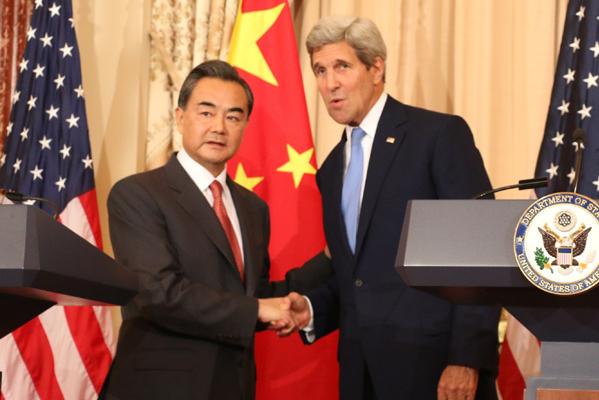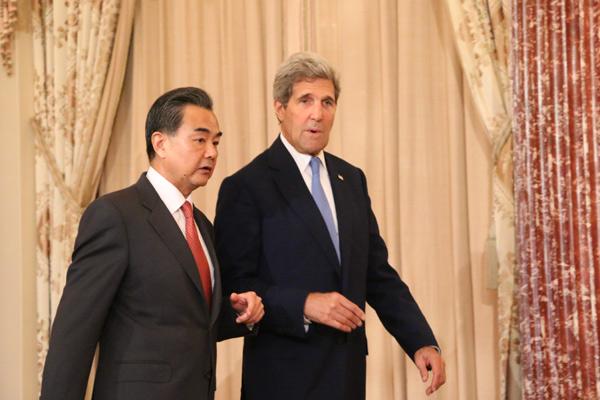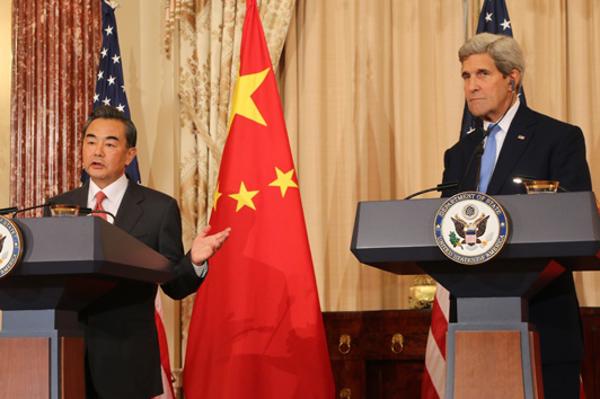
Foreign Minister Wang Yi (left) shakes hands with US Secretary of State John Kerry on Oct 1 after they addressed the press in the Ben Franklin Room of the State Department in Washington, ahead a bilateral meeting on a wide range of issues.[Photo by Chen Weihua/China Daily]
Top Chinese and US diplomats are trying to find ways to further expand cooperation and effectively manage the differences between the two countries.
Foreign Minister Wang Yi said the two countries need cooperation. “We can cooperate with each other, and there is an increasing list of areas of cooperation between us, and I believe the list can go on,” he said on Oct 1 in a joint press briefing at the State Department with US Secretary of State John Kerry ahead of their bilateral meetings to discuss a wide range of issues.
Wang called it a very important common mission for the two countries to build a new model of major country relations featuring non-conflict, non-confrontation, mutual respect and win-win cooperation.
But he does not think the process of building a new type of major country relationship will be all smooth sailing. “There will be various risks and challenges on the way,” he said.
The 60-year-old career diplomat arrived in Washington on Sept 30 after a three-day visit to Mexico. He was in New York last week for the meeting of the United Nations General Assembly.
Comparing the bilateral relationship to a giant ship sailing on the sea, Wang said it requires both sides to work jointly to keep the ship on the right course, keep injecting the impetus for it to forge ahead, and at the same time, to work jointly to properly handle hidden rocks and shoals.
“I believe we need to enhance mutual trust, strategic trust, reduce mutual strategic misgivings, and reduce our misjudgment,” he said. “As long as we work jointly in that direction, we will be able to meet our goal.”
Wang described his main mission of his trip as discussing the upcoming trip by President Barack Obama to China for the APEC meeting and visit to China.

Foreign Minister Wang Yi (left) and US Secretary of State John Kerry walk towards the podium in the Ben Franklin Room of the State Department in Washington on Oct 1 before they address the press ahead of their bilateral meeting. [Photo by Chen Weihua/China Daily]
Many observers of China-US relations are worried that the competitive factors and differences between the two countries, if handled unwisely, are likely to take over the relationship despite their entwined economic and trade ties and growing people-to-people and military-to-military exchanges.
Disputes and incidents in the past year in areas such as cyber security, military encounter in the sea and tensions in both the South and East China seas have cast a shadow on the relationship since Xi and Obama met at the Sunnylands estate in California in June last year with a consensus for a new type of major country relationship to defy the historical rivalry between a rising power and the existing power.
While Kerry expressed his concern over Hong Kong in the ongoing Occupy Central movement, Wang was quick to point out that Hong Kong affairs are China’s internal affairs.
“All countries should respect China’s sovereignty. And this is also a basic principle governing international relations,” he said.
China has carried out a policy of non-interference in other country’s internal affairs, and has refrained from criticizing US domestic policies and practices, such as during the 2011 Occupy Wall Street movement and the racial riots in Ferguson, Missouri, in August.
“I believe for any country, for any society, no one will allow those illegal acts that violate public order. That’s the situation in the US, and that’s the same situation in Hong Kong,” said Wang. ”We believe that the Hong Kong Special Administrative Region’s government has the capability to properly handle the current situation in accordance with the law.”

Foreign Minister Wang Yi (left) speaks to the press in the Ben Franklin Room of the State Department while US Secretary of State John Kerry looks on during a press briefing on Oct 1 ahead their meeting to discuss a wide range of issues. [Photo by Chen Weihua/China Daily]
Foreign Ministry spokeswoman Hua Chunying said in Beijing on Sept 30 that China urges relevant countries to be prudent in words and deeds, refrain from interfering in Hong Kong’s internal affairs in any way, and do not support the illegal activities such as the “Occupy Central” nor send any wrong signal.
Kerry, who had met Wang several times this year, reiterated the US stance of welcoming the rise of a peaceful, prosperous and stable China, and one that plays a responsible role in Asia and the world, and contributes to upholding the existing rules and norms on economic and security issues.
He praised China’s contribution to the fight against the deadly virus Ebola in West Africa, where China has sent medical personnel, equipment and money.
“We view that in very positive terms with respect to China’s important role in global leadership,” Kerry said.
He said that is why the two countries are committed in trying to find ways to cooperate on those issues of greatest consequence on a global basis while managing some of their differences effectively.
“We want to show a new model of relations in which we broaden our cooperation on the common interests and constructively manage those differences so that we can be as effective as possible,”
Kerry said he was encouraged in his meeting last week with Chinese Vice-Premier Zhang Gaoli at the United Nations. “I left those meetings encouraged, significantly encouraged, by his commitment on behalf of China to the dialogue with respect to climate change,” Kerry said.
He said Obama is personally looking forward to attending APEC summit in November.
“I think that the foreign minister and I in a few moments will discuss how we can make certain that that visit is a success, that it is as productive as possible, but also so that the APEC summit is the success that we all want it to be,” Kerry said.
